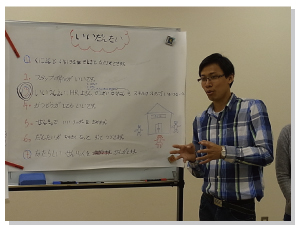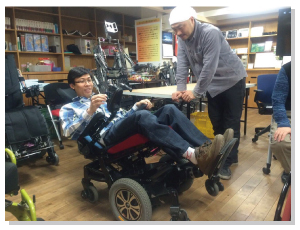- HOME
- Alumni News
- Sereypong CHHIM (17th trainee)
- Pong's Final Report
Pong's Final Report
Final Report
1.Self introduction
My name is Sereypong. I am from Phnom Penh, Cambodia, and I am one of the 17th Duskin leadership program trainees. I was born in 1985 in Kampong Chhnang Province. When I was 3, I contracted polio. I have three siblings. I have an elder sister and brother, and a younger brother. I am the only one with a disability. 15 years ago, my mother became disabled as well because of an illness. When I was 9 my father passed away from an illness, so my mother brought us up by herself. I now work as a civil servant, in the capital of Phnom Penh.
2.Living in Japan for the first time
I arrived in Japan in September last year, and studied Japanese for 3 months. Every Wednesday I had a swimming lesson and I also participated in many sports activities. In October last year I also participated in a wheelchair marathon. Together with a friend I often went to Yoyogi Park to run. In January this year, I had ski training in Niigata Prefecture. My physical condition is so much better now that I experienced many sports activities in Japan.
I also stayed at the home of Mr. Itani host family for one week, in Matsuyama City, Ehime Prefecture. During the home-stay, we kneaded rice cake together, enjoyed delicious New Year cuisine, and played games. On the last day of the home-stay program, we went to Matsuyama Castle. There was no elevator leading up to the castle so I asked a personal helper to push my wheelchair. The home-stay program taught me about the culture and people’s lives in Japan.
3.Individual training
I had, even from before visiting Japan, been interested in education for children with disabilities, and employment for people with disabilities. This means I had three goals for the training. One was to learn about social enterprises for / by people with disabilities. The second was inclusive education for children with disabilities, and the third was project management. For 10 months I went to various places to attend my training programs. There were many of them but I would like to talk about Center for Independent Living STEP-Edogawa, Japan National Assembly of Disabled Peoples' International (DPI-Japan), NPO Management Forum, AJU Center for Independent Living, and AAR Japan (Association for Aid and Relief, Japan), and Cocoron.
Center for Independent Living STEP-Edogawa
STEP-Edogawa has four important functions. They are: advocacy, sending helpers, peer counselling, and independent living program. Together with the staff of STEP-Edogawa, I went to have a look at the room where people could experience independent living. I was introduced to many interesting facilities for people with disabilities, including electric beds, bathrooms, toilets, lifters, and sinks. I also had an enjoyable experience, having a discussion and interactions with the staff of STEP-Edogawa, about people with disabilities in our respective countries.
Japan National Assembly of Disabled Peoples' International (DPI-Japan)
DPI-Japan was established in 1986. It has been devoted to important activities, including advocacy, protecting rights for people with disabilities, Braille printing, and international cooperation. The people there told me about the history of movement for / by people with disabilities, employment system for people with disabilities, and incurable diseases.
DPI also engages in a number of international activities. They include JICA’s projects in South Africa, and participation in conferences about the Convention on the Rights of Persons with Disabilities. During the training I also learned about the parallel reports on the Convention on the Rights of Persons with Disabilities, and about why it is important to incorporate disability perspectives into the agenda for development. As I am interested in disabilities and inclusive development, I am certain this training will be very useful for my future work.
NPO Management Forum
There were 39 participants in the Management Forum, from Germany, Britain and Australia. There were 40 participants from Japan. All of the participants were from organizations for the elderly, people with disabilities, and youth. In the forum, we discussed how business enterprises and non-profit organizations could work together. Non-profit organizations’ roles are becoming increasingly more important, so they are expected to cooperate with business enterprises and bring their strengths together to solve social issues. It was a great learning experience for me to listen to the case studies of various countries. When I go back to my country, I will think about ways for business enterprises and non-profit organizations to work together.
AJU Center for Independent Living
I took part in a meeting with Chubu District Transport Bureau for a discussion and negotiation about barrier-free transport system. I think it is important for civil servants and various stakeholders to discuss barrier-free transport together. I also went to check the level of barrier-free-ness at Chubu Centrair International Airport. I found that the toilets, nursing rooms, elevators, vending machines and car parks were barrier-free, easily accessible for people with disabilities, the elderly, and people with prams. I also participate in Nagoya City’s policy promotion meeting where budgets for the welfare of people with disabilities, the city’s basic plans for people with disabilities, and initiatives to eliminate discrimination against people with disabilities were discussed. I think it is very good that many different parties get together to talk about how to solve issues. If we could do the same thing in Cambodia, Cambodia will be a lot more barrier-free.
Association for Aid and Relief, Japan(AAR-Japan)
AAR-Japan started in 1979, from the activities of people to help refugees who arrived in Japan from Indochinese. Currently, AAR-Japan has 5 operations in 15 countries, including emergency support, support for people with disabilities, actions against landmines, actions against infectious diseases, and making suggestions and dispatching information about these issues. During this training, I learned about the history and activities of AAR-Japan, project management, AAR-Japan’s support for people with disabilities, and about inclusive education in Cambodia, Haiti and Tajikistan. AAR-Japan is engaged in inclusive education in Cambodia, so I hope they work together with organizations in Cambodia to improve their activities even further.
Social Welfare Service Corporation “Cocoron”
Cocoron started in March 2004 as a local center to support the living of people with mental disabilities. Right now, they are engaged in many activities. This includes 1) Supporting employment: running Café Cocoroya, where they sell vegetables and other home-made products and can also enjoy coffee and tea, delicatessen Nagomi No Ie, and kitchen Cocoron Kobo, to help them work, 2) Supporting the living of people with mental disabilities: running a group home, care home, home helper service, and a living service center Cocoron. Cocoron uses resources from local agriculture and mountains, which is a very good thing. As Cambodia is a developing country, it is better to utilize local resources for people with disabilities, like Cocoron.

4.My plans after returning to Cambodia
When I return to Cambodia I would like to do the following three things.
1. I will continue to work in the Cabinet Office. Eventually I would like to be a member of the national disability committee.
2. I want to start inclusive education in the country for children with disabilities.
3. I would like to establish a company for people with disabilities.
During the 10 months in Japan, I had a great opportunity to study Japanese, the activities of people with disabilities in Japan, and their leadership, to great depth. After going back to Cambodia, I would like to use the knowledge I gained in Japan to create an environment for people with disabilities in Cambodia where they can live comfortably and safely.
I would like to express my heartfelt thanks to everyone at the Duskin AINOWA Foundation, Japanese Society for Rehabilitation of Persons with Disabilities, and everyone else to whom I owe my experience in Japan. Thank you so much.





